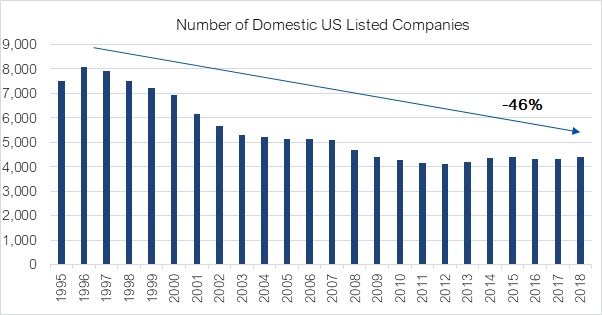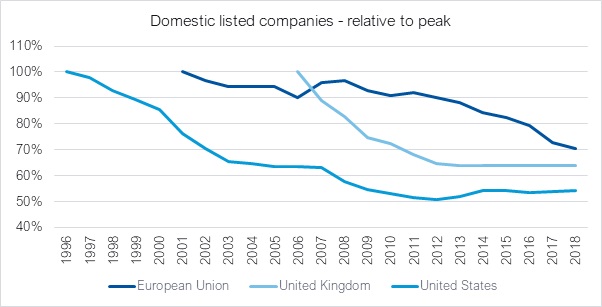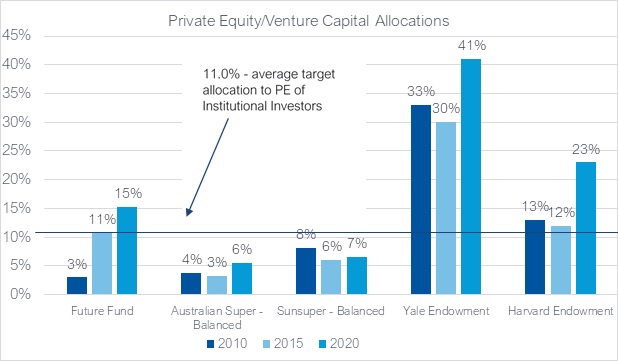Another reason to consider private equity
With the value of US equity markets more than doubling over the past decade, it is surprising to see that the number of companies on US exchanges is rapidly diminishing. This growth in US market capitalisation is primarily due to rising share prices as opposed to an expanding universe of listed companies.
We have witnessed a steep decline in the number of companies listed on US exchanges, as initial public offerings (IPOs) haven’t kept up with de-listings driven by mergers and acquisitions (M&A) and bankruptcies. This shortfall in IPOs can partly be put down to businesses choosing to stay private for longer.
Where companies have traditionally gone down the IPO route to raise capital to further expand their businesses, private capital is proving to be a more cost-effective and timely way to raise money to grow their business. As public stock markets are shrinking, we are seeing investors increase allocations to private markets with Preqin data stating the median allocation to alternatives of global public pension funds has increased from 18% in 2010 to 30% in 2020.
According to the World Bank, over the period from 1996 to 2018 the total market capitalisation of domestic listed US businesses has grown from less than US$10 trillion to now over US$30 trillion. But over that same period, the number of domestic US listed businesses fell by 46% from around 8,000 to fewer than 4,500.

Source: World Bank

Source: World Bank
While the US is leading this trend, it is being reflected in other developed markets.
The chart below shows the current number of domestic listed companies in each of the US, UK and European Union (EU) relative to their peak. It highlights that while the US has been experiencing this trend for the longest, it is also pronounced in the UK and EU with the number of domestic listed companies down 36% and 30%, respectively, from their peaks.

Source: World Bank
There are several factors behind this trend, including:
- Consolidation – There is a natural level of consolidation through M&A over time, and natural attrition as failing businesses go bankrupt or delist;
- Fewer IPOs – the reduction in numbers through M&A and bankruptcy has historically been more than offset by new companies coming to market through IPO. In 1996, there were 845 IPOs in the US. In 2016, there were only 128. Over the past 25 years, IPOs have not been enough to make up for the reduction in numbers from M&A and attrition.
- The growth in private equity funds - A further factor which we believe is important in this trend is the growth in professionally managed private capital over the same period. According to data from Preqin, total private equity AUM has grown by 11.5% p.a. from 2000 to 2020, with particularly strong growth in the last five years. This has provided significant firepower to these managers to invest in or buy companies which otherwise may have gone public to raise additional capital. It has also meant that rapidly growing companies have been able to remain private to a far larger scale than would historically have been possible.
Given that Preqin predicts that private equity assets under management growth will accelerate to over 15% per annum over the next five years, this is a trend that is likely to persist for some time to come.
In recent decades, sophisticated investors, including super funds and endowments, have moved their asset allocation toward private markets in search of higher returns. The chart below demonstrates this with Australia’s Future Fund allocating 15% to private equity and venture capital. If we look at Yale University’s Endowment Fund, run by David Swensen until recently, it has a 41% allocation to private equity and venture capital. Swensen, often considered a pioneer in asset allocation, delivered excellent long term returns for the Fund by switching from predominately US equities in the 1980s to alternative assets.

Source: Preqin, endowment and Super fund reports.
The major outcome of this is that the investible universe of listed stocks has become smaller in number and more concentrated in large/mega-cap companies. The opportunity set for small and mid-cap equity managers has substantially narrowed. Furthermore, to gain access to some of the most exciting growth companies, investors will need to consider an allocation to private equity or venture capital.
Traditionally, investments in private equity or venture capital were made through complex partnership agreements requiring large undrawn capital commitments, years for that capital to be invested, along with long lock-ups and no liquidity. There is now an alternative way to access alternative assets through listed markets. Listed private equity companies are publicly listed entities with portfolios of private equity investments. Like listed REITs and listed infrastructure funds, listed private equity provides a simple structure to invest in private equity with transparency and liquidity.
Not an existing Livewire subscriber?
If you're not an existing Livewire subscriber you can sign up to get free access to investment ideas and strategies from Australia's leading investors.
And you can follow my profile to stay up to date with other wires as they're published – don't forget to give them a “like”.
3 topics
1 contributor mentioned

